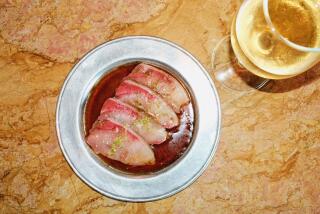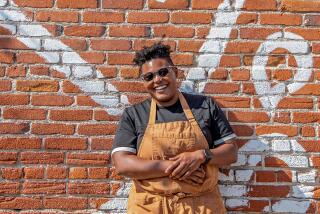Khan Saab puts Indian, Pakistani and Afghan cuisines front and center
Imran Ali Mookhi grins as the smoked beef kabob arrives at the table.
The plate is enclosed in a glass dome cover filled with smoke. He lifts up the cover in a circular motion, allowing the smoke to disperse and reveal the pieces of top sirloin, served with yogurt, garlic, shallots, mustard oil and tomatillo chutney.
The salmon kabobs at his new Fullerton restaurant Khan Saab, which soft opened in early February, are served the same way.
“I call these two dishes the show stoppers,” he says. “They get smoked in charcoal in the kitchen for 12 hours, and when it comes out, you can taste the smokiness, but there’s no show to it. So we wanted to take the extra step and elevate it.”
Executive chef Mookhi, who’s also behind Tumbi in Santa Monica, first arrived in Los Angeles from Karachi at age 17 with no plans — only a vague idea that he’d eventually apply to college to study engineering.
He remembers having to stay overnight at LAX for two days, because a distant cousin who was supposed to pick him up never showed up. An Indian cab driver drove him to a 7-Eleven, and the owner let him stay in the storage space for two nights. The men made some calls and found another friend, who offered the stray teenager a job as a dishwasher at an Indian restaurant.
But in the last couple decades, as he eventually worked his way up in the culinary industry, he also remembered a lavish childhood in Pakistan. His father was a bank manager, and he grew up with drivers, maids and a taste for luxury.
“I’d go to Italian restaurants and French restaurants and see the food presented so beautifully that you literally don’t want to even touch it,” says Mookhi. “And I’d think, how come Indian food and Pakistani food can’t be that way? It’d drive me nuts.”
Khan Saab Desi Craft Kitchen is a halal, farm-to-table restaurant serving a mix of Indian, Pakistani and Afghan cuisines.
The name translates to Mr. Khan, chosen because the popular surname spans various countries in South Asia and the Middle East. Mookhi designed their logo, a man with hipster yellow sunglasses and a turban with a feather coming out of it, to signify a fashionable desi man living in America.
In addition to the kabobs, popular in Afghan cuisine, the menu includes Indian and Pakistani street foods like pani puri and keema pav (their version, called “Sloppy Khan” as a nod to sloppy joes, is with grass-fed Wagyu beef), as well as dishes like chicken karahi and biryani that require at least 20 minutes of prep time so they can make it by scratch per order.
“Traditionally when you eat this back home, there are restaurants that specialize in biryani and karahi, and it takes 45 minutes to make,” says Mookhi. “You can watch them put in the tomatoes and meats and spices, and we wanted to keep it the same.”
The curries include mutton korma (goat curry made with yogurt and honey), chola bhatura (spiced chickpeas with wok-fried bread) and the Kashmiri dish lamb rogan josh. Mookhi emphasizes that he got the recipe for their dal lala mussa (a lentil dish) straight from Lalamusa, Pakistan.
There’s also a selection of halal steaks, created with the help of chef Dominic Crisp. In addition to the more affordable Australian Wagyu beef ribeye, new york strip, coulotte and brisket options, there’s a woodfired bone-in tamahawk priced at $150.
“My family is strictly halal, so they can’t just go anywhere and eat steak,” says Mookhi. “Everyone, when I was putting the menu together, was like, ‘Nobody is going to buy a $150 steak,’ and I was like, ‘I don’t care. I just want to make a statement about how there can be a high-end $150 Wagyu steak that’s halal,’ and believe it or not, so far it’s our most popular steak.”
They also feature an alcohol-free bar led by mixologists Ahmad Hosseini and Luis Valencia. It includes mocktails like a mango mojito, nigroni and a Bloody Patahni (their version of a Bloody Mary).
Mookhi has worked in various Indian restaurants in the last 20 years, as both a chef and a consultant. During the aughts, he was the sous chef at Silverlake’s Tantra, an Indian fusion restaurant which made news for offering a $100 galub jamun covered in edible gold. In 2013, Jonathan Gold wrote that Newport Beach’s Tamarind of London, where Mookhi was an executive chef, “may be SoCal’s best Indian restaurant.” And most recently, he helped San Francisco’s Dosa get their packaged foods into grocery stores like Whole Foods.
But for Khan Saab, he’s leading with his Pakistani roots. He collaborated with artist Naeem, who hand-painted a mural inside the restaurant which features a movie poster from the classic Pakistani film “Khatarnak Hassena,” as well as images of busy locals on the bustling street of Karachi that remind him of childhood.
“Khan Saab” is also a nod to the nickname of the late legendary Pakistani singer Nusrat Fateh Ali Khan, and the restaurant plays Sufi music, instead of the more popular Bollywood hits.
Mookhi thinks most Americans still aren’t exposed to the depths of South Asian food. His goal is for his customers, especially with California’s growing South Asian community, to be familiar with the recipes he learned directly from Pakistan’s kitchens and India’s street stalls — and to consider them mainstream.
“I want people to have Indian and Pakistani food almost every day,” says Mookhi.
The grand opening of Khan Saab Desi Craft Kitchen (229 E Commonwealth Ave Unit A, Fullerton) will take place on Feb. 19. Along with dinner, there will be a ribbon-cutting ceremony with the Consulate General of Pakistan and henna artists. All proceeds from the evening will benefit the National Alliance on Mental Illness of Orange County (NAMI). For more information, visit khansaaboc.com.
More to Read
Eat your way across L.A.
Get our weekly Tasting Notes newsletter for reviews, news and more.
You may occasionally receive promotional content from the Los Angeles Times.







